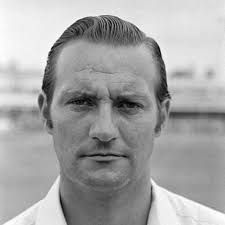'For those who saw me bat, let me apologise' he would say, before delivering a talk that displayed a sense of humour as expansive as his batting frequently wasn't. A man of contrasts then, engaging company off the pitch, a gritty, stereotypically northern batsman on it. Brian was like the northern batsmen recounted by Neville Cardus, with 'no fowers before lunch and precious few afterwards'.
His death was announced today and it was rather like the man himself, quiet and undemonstrative. Growing up in Yorkshire, he graduated to the fine side of the late 1950s and early 1960s and was a solid, dependable member of it, before being replaced by a younger model, the man who defined that moniker, Geoffrey Boycott. He made the England side and played for it seven times, averaging 41 and never being dismissed in single figures in his twelve innings-career, a record that still stands. His highest score was 88 and in hitting his first ball in Test cricket back over the head of the bowler, Wes Hall, he made perhaps one of the most uncharacteristic of introductions to the international game.
He moved south and became a fixture in the Nottinghamshire side in 1963, where he remained for a decade. He racked up his thousand runs for the season in ten summers, the benchmark by which the county stalwart was judged and provided the reliable grit in that period, the side's batting and cricket latterly dominated by Garfield Sobers. In much the same way that I hoped for Chris Wilkins to get in early at Derbyshire, supporters in Nottingham saw those who came before Sobers as merely a warm up act, but the runs he scored, more than the way that he made them, ensured he was a respected and valuable part of the team.
In 1973 he moved to Derbyshire as captain, in a period when our recruitment was generally of ageing players from elsewhere. It was an onerous task, as it was one of the weaker sides I have seen in county colours and at 39 Brian was understandably past his best. Too many good senior players had left at the same time and the batting was flimsy, at best, the bowling perhaps even weaker. It accounted for him being unwilling or unable to take a risk, as batsman or captain, knowing full well that two quick wickets often heralded an unseemly and hasty demise for the innings. The result was runs made less against the clock than the calendar.
Again though, he registered a thousand first-class runs in two seasons, even if one-day cricket wasn't really his game. With the resources at his command, his approach was often to try and avoid defeat, something that couldn't work in a limited over match, of course. It made for grim watching in that period, but it took someone special, with the ability, charisma and sheer personality of Eddie Barlow, to rescue the county from the doldrums in 1976.
I will remember him as a batsman strong off his pads and not without strokes, but his unwillingness to use them or take a risk, while understandable, made for Derbyshire watching that was only for the diehard and purist. He will best be remembered, perhaps, as the man who sent Alan Ward off the field for refusing to bowl, against Yorkshire at Chesterfield in 1973.It wasn't the best day for either man, but we all make mistakes.
He later served as an England selector and chair of the management advisory committee, before becoming Nottinghamshire president for two years.
His death, at the age of 86, will be mourned by cricket supporters of a certain vintage in three counties. Few will remember him for his effusive stroke play, or for inspirational captaincy.
But he was a man who always gave one hundred percent and over 25,000 runs in the first-class game confirms that he could play. Besides anything else he was a lovely bloke and few had a bad word to say about him.
Most of us would take that as an epitaph.
Rest in peace, Brian.

Thank you for this perceptive, beautifully written obituary.
ReplyDeleteA memory of Brian Bolus. Watching Derbyshire at Queens Park in the 1970s one day saw Brian Bolus miss at least one catch off the bowling of Mike Hendrick who was not impressed. Hendrick loped across to pick up one of the large, square, metal meshed park rubbish baskets that were located around the boundary. Hendrick made his way across to his captain in the outfield and presented it to him. Needed no words. Neil Jones
ReplyDelete